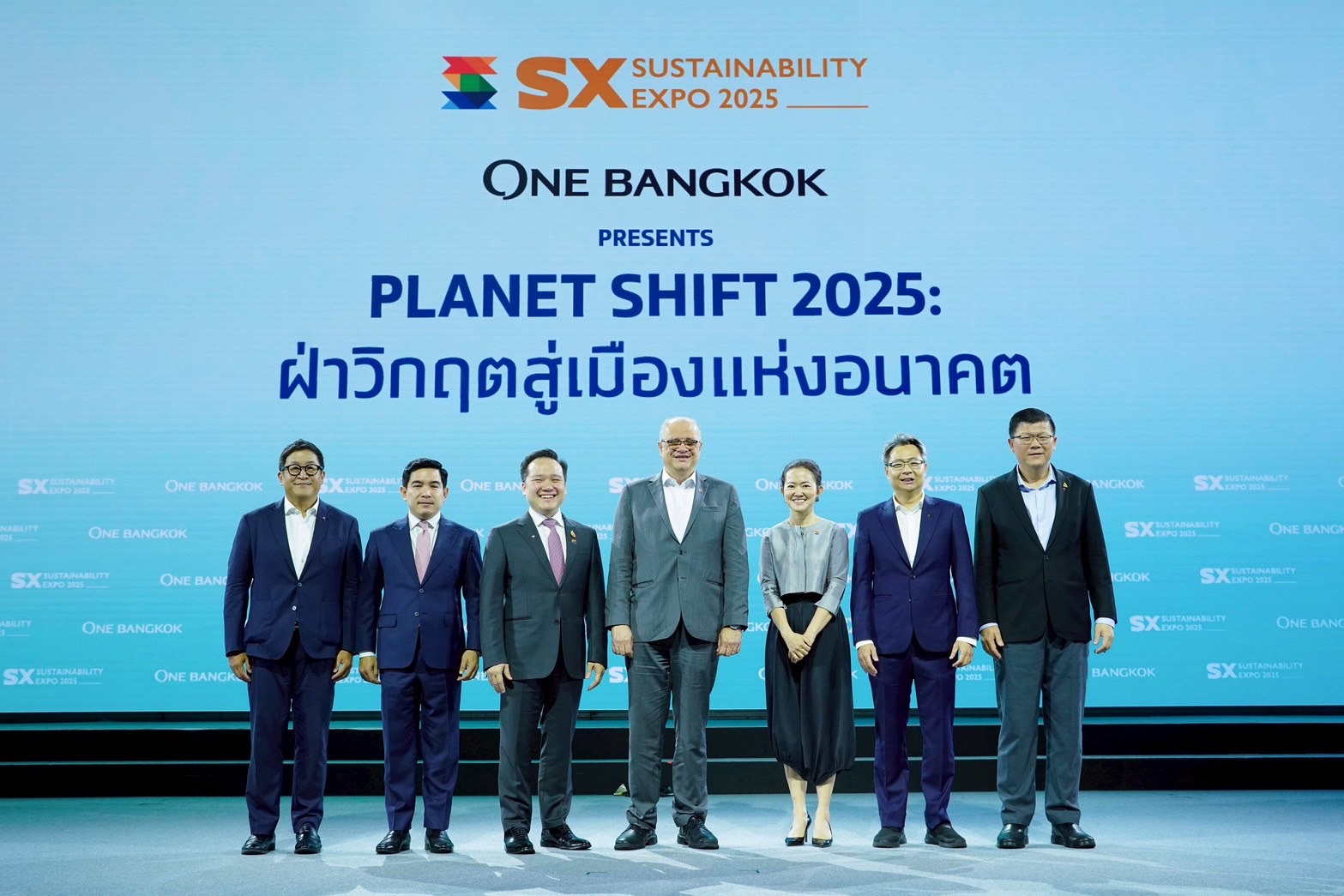Search
Recent Search
Directory Shop

Recent Search
Directory Shop
21 Oct 2025

At the recent Sustainability Expo 2025, One Bangkok hosted a special forum titled "Planet Shift 2025: Navigating the Crisis Towards the City of the Future." Leaders from the public and private sectors participated, outlining collaborative efforts to advance the city. The discussion aimed to transform the mindset from "adapting to change” to "designing the future" for true sustainability.
Shifting from "Adapting" to "Designing the Future"
The forum began with a keynote presentation on "Shaping the Future of Resilience" by Dr. Youssef Nassef, Director of the Adaptation Division at the United Nations Framework Convention on Climate Change (UNFCCC). Dr. Youssef highlighted the climate crisis the world faces, noting that the response is not limited to reducing greenhouse gas emissions but is also about improving resilience. He stated that this represents what "designing of the future" is needed, requiring consideration of ecological realities, integration with technological dynamics, and careful assessment of long-term impacts and benefits, rather than focusing solely on the short term. This involves a holistic view and understanding of trade-offs. He also emphasized the importance of integrating knowledge from diverse sources, including science and traditional wisdom, concluding with the thought: "The future does not happen to us. We happen to the future", which he identified as a core principle for driving towards the city of the future.
Architects of the Future – Building Cities with a Sustainable Vision
The discussion then transitioned to a special dialogue, "The Future-Proof Paradigm," where Panote Sirivadhanabhakdi, Group Chief Executive Officer of Frasers Property Limited, offered the private sector's vision for future urban development. He stressed that this evolution transcends mere physical expansion, but rather prioritises a transformative "mindset" that elevates the quality of life for residents while simultaneously nurturing balanced economic, social, and environmental prosperity.
Central to this approach is the concept of "Moderation, Reasonableness, Prudence", an extension of the philosophy of sufficiency economy, that was presented as the foundation for development. This framework posits that true sufficiency is not static, but rather a dynamic growth rooted in reason and resilience – a vital equilibrium between advancement and preservation, forming the bedrock of long-term sustainability.
Panote added that sustainable urban development begins with acknowledging the profound interconnectedness of all elements: cities, people, and the environment, each mutually dependent and contributing value. As one thrives, so too do others, in harmonious progression. Sustainability, therefore, is not a finite goal, but an inclusive process of collective growth.
This very philosophy is meticulously woven into the fabric of One Bangkok, conceived as far more than a real estate venture. It is a meticulously designed urban ecosystem, seamlessly integrating economic, social, and environmental dimensions to cultivate a city that thrives with enduring stability and shared value. This vision perfectly encapsulates Frasers Property's purpose: "Inspiring experiences, creating places for good."
The event concluded with a panel discussion on "Sufficiency in City Development: Private & Public Sectors Undertaking," which explored the concept of "sufficiency" in sustainable urban development. Representatives from the public, private, and financial sectors exchanged views.
Pornphrom Vikitsreth, Advisor to the Governor of Bangkok and Chief Sustainability Officer of Bangkok, discussed applying the sufficiency concept at the city level to ensure Bangkok's balanced growth between development and resource conservation for future generations. He mentioned collaboration with the private sector in campaigning and educating on efficient waste management.
Dr. Jirawat Panpiemras, Vice President, Office of the President, Bangkok Bank, offered insights from the financial sector, stating that a "sufficient city" requires a foundation of good economics, society, and environment. Bangkok Bank has supported economic development and now places greater importance on green investments. These investments actively support eco-friendly initiatives, drive carbon reduction, and align with critical environmental objectives like the Paris Agreement (limiting global temperature increase to 1.5 degrees Celsius).
Urasate Navanugraha, Chief Investment Officer, One Bangkok, elaborated on the prioritization of "sufficient investment" within One Bangkok which emphasised efficient utilisation of resources, whilst also championing green investments that meticulously consider environmental impact. He affirmed that all these endeavors are guided by the principles of "balance" and "responsibility" across societal, economic, and environmental sustainability.
One Bangkok: Driving Sustainable Returns Through Green Investment
Urasate further detailed One Bangkok's pioneering approach to large-scale real estate development, intrinsically linking sufficiency with sustainability. The project exemplifies this by efficiently utilizing prime downtown land while devoting a substantial 25 rai of lush green space back to the city. Beyond this, its meticulously planned infrastructure actively promotes public transportation, offers direct connection to the expressway to alleviate traffic congestion, and incorporates utility systems designed for optimal energy and water conservation. Tangible examples include a centralized air conditioning system that achieves up to 15% energy savings and a water recycling system projected to save nearly 3 million cubic meters of tap water annually. Urasate pointed out that investing in green projects can reduce operational costs, enhance competitiveness, and attract a growing segment of sustainability-conscious clients, particularly multinational corporations who prioritize green-certified buildings. Moreover, the project's green credentials substantially streamline access to Green Financing opportunities.
Conclusion: A Unified Front for a Brighter Future
These insightful discussions demonstrate the commitment and robust collaboration across all sectors towards building the city of the future. This vision extends beyond mere aesthetics and prosperity, firmly embracing sufficiency, enduring sustainability, and a harmonious equilibrium between economic vitality, societal well-being, and environmental stewardship. The journey towards this transformative future begins with a clear, shared mindset, propelled by sustained action, and fortified by united forces. Together, we can surmount challenges and advance towards our collective aspiration: "Sufficient for Sustainability," ensuring a happier, higher quality of life for all.
Gallery
Tag
SHARE